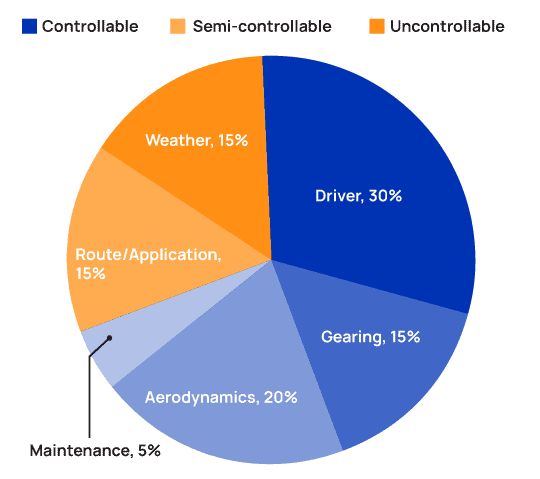A rapid spike in fuel price impacted the bottom line for fleets in 2022. Diesel costs increased the value of technology that helps to reduce fuel use, such as real-time fuel efficiency coaching, speed limiters, and more efficient engines.
The rise in fuel costs was severe enough to supplant driver shortages as the top concern for the trucking industry, according to a report released by the American Transportation Research Institute (ATRI). This shows that fuel price fluctuations have created significant cost uncertainty.
Fleets can mitigate rising fuel prices by working with drivers to curb fuel consumption. Research shows that drivers can create the most impact on fuel efficiency, and fleets can reduce fuel use through driver training, engagement, and incentive programs supported by in-cab technology.
Download guide – Team Up with Drivers to Save Fuel
How fleets respond to volatile fuel price trends
At the start of the 2010s, fuel accounted for 39% of the average cost per mile for fleets. A few years later, the driver shortage took over as the primary concern when diesel prices had less of an impact on a carrier’s bottom line.
This trend is primed to repeat this decade. In 2022, fuel cost jumped above $5 USD per gallon, creating a price shock. The American Trucking Associations projects the driver shortage will grow to 160,000 by 2030. Even if fuel prices remain volatile, the driver shortage will likely return as the biggest challenge—similar to the previous decade.
What can fleets do when fuel prices rise? Carriers concerned about costs roll out different eco-driving strategies:
- Fuel-efficient engines and technology like speed limiters
- Aerodynamic improvements to tractors and trailers
- Engines powered by electricity or compressed natural gas
- More efficient operations that reduce out-of-route and empty miles
- Driver training and better awareness of eco-driving techniques
All of these strategies help to reduce fuel consumption, but better driver training creates the best results with the least investment. Training and feedback on driving behaviors also provide an opportunity to improve driver engagement—a key aspect of driver retention.
Understanding how drivers impact fuel use should govern how you work with drivers to lower consumption.
How drivers impact fuel consumption
The Technology Maintenance Council (TMC) discovered that the difference between the most fuel efficient driver and the least efficient was as much as 35%. This means that under the exact same driving conditions, operating the same truck, the least efficient driver can consume about a third more fuel than the most efficient driver.
Research by ATRI backs up TMC’s report, showing that drivers create the single biggest impact on fuel efficiency compared to all other factors.

How can drivers change their habits on the road to reduce fuel consumption? ISAAC has studied the question from the moment it became involved in the trucking industry.
Four general areas allow drivers to save fuel.
Engine efficiency—The way drivers use the transmission is one of the biggest factors under their control. Lower engine speed (RPM) results in less fuel use, especially for diesel engines that create max torque at low RPMs.
Vehicle speed—Traveling at excessive speed wastes fuel. A truck driver saves more fuel when maintaining a steady pace short of the top speed limit.
Brake use— Brake use on its own doesn’t determine fuel consumption, but drivers who brake suddenly and frequently will need to constantly re-accelerate to regain speed. Drivers consume less fuel when anticipating traffic conditions to use coasting and maintain a fuel-efficient speed.
Driver behavior—Drivers who are fully engaged and mindful of their surroundings will use fuel efficient driving techniques more consistently than less engaged drivers. Fleet managers can use data to help verify driver behavior.
Fleets motivate drivers with incentive programs
The best way to engage drivers and encourage consistent, fuel-efficient behavior is through an incentive program that rewards drivers for reducing fuel use. This program should focus only on factors under the driver’s control and avoid penalizing drivers for older truck performance, bad weather, or heavier loads.
Fleets can use the ISAAC Coach to measure and factor out slope, load, wind, engine type, and aerodynamics—elements beyond driver control. Instead, drivers get simple, unobtrusive guidance that promotes better eco-driving behaviors.
Since the ISAAC Coach supports an equitable rating of drivers carrying different loads under varying conditions, fleets can fairly measure the performance of their drivers and reward them accordingly. A fair, transparent incentive program helps to align drivers with fuel reduction objectives and can even be used as part of a larger driver retention program.
Fleets and drivers thrive through collaboration
Fleets that offer incentive programs and work closely with drivers to save fuel create a mutually beneficial scenario. Drivers appreciate the opportunity to earn rewards for fuel efficiency, while fleets benefit from lower fuel costs and a boost to driver retention.
The ISAAC Coach helps to simplify the implementation of incentive programs and gives guidance that’s easy for drivers to follow. In fact, carriers save up to five percent fleetwide when their drivers use the ISAAC Coach as part of a fuel savings program.
Find out more about working with drivers to save fuel.

About the author
Julien-Pierre Daigle, P. Eng.
Data Analysis Engineer, ISAAC
Julien-Pierre Daigle is a Data Analysis Engineer at ISAAC. Within the Data Science and Artificial Intelligence team, he participates in the development of feature engineering. More specifically, he prepares the data to make it usable by the rest of the team. Big data, in its simplest form, is practically unusable. It must be filtered, grouped, and sorted while retaining its original value and meaning. With 15 years of experience in vehicle data analysis, and 10 years with ISAAC, he shares his knowledge to tell trucking-relevant stories using the ISAAC solution data. Trained as an accident reconstruction engineer, Julien-Pierre leads the service of telemetry reporting used to explain and demonstrate the facts of incidents. As with big data, raw data alone does not explain an event. Understanding the data and the physics is therefore essential for explaining the facts.









